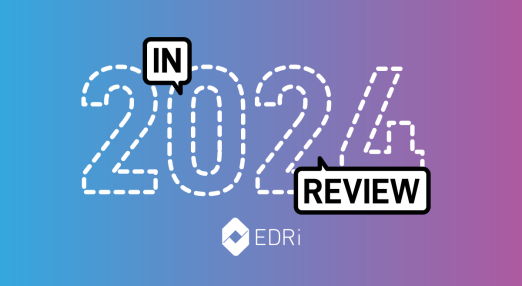EDRi
Filter by...
-

GDPR Procedural Regulation: A critical opportunity to strengthen cross-border enforcement
As EU negotiators continue trilogue discussions on the GDPR Procedural Regulation, civil society organisations across Europe are raising the alarm: the proposed reforms risk failing to address the long-standing enforcement challenges that have undermined the GDPR’s effectiveness. In a joint letter, EDRi, Access Now and 34 fellow organisations call on policymakers to prioritise robust, rights-centred enforcement mechanisms that ensure individuals can meaningfully exercise their rights.
Read more
-

Chaos Computer Club supports hackers facing legal battle with railway manufacturer
Three ethical hackers were targeted by Polish railway manufacturer Newag after exposing anti-competitive practices. EDRi member Chaos Computer Club is backing the researchers to ensure they can continue their vital work without fear of legal retaliation.
Read more
-

Civil Society Demands: European Commission Must Close e-ID Loopholes!
In a coalition of 15 civil society organisations, EDRi member epicenter.works published an open letter demanding that the European Commission close loopholes in the European Digital Identity Wallet. They highlight risks for privacy and transparency in recent eIDAS implementing acts.
Read more
-

The mirage of EU techno-solutionism to the climate crisis
Technology, as shaped by today’s market-driven priorities, carries immense hidden environmental and social costs. The tech sector is one of the fastest-growing contributors to waste and energy consumption. In 2021, it was responsible for two-to-three percent of global carbon emissions — on par with aviation.
Read more
-

Why Ireland is the Achilles heel of the EU’s fightback against Big Tech
The recent controversies surrounding Big Tech moguls Elon Musk and Mark Zuckerberg — who are defying content moderation norms and accusing the EU of censorship — should come as no surprise to those following the tech industry closely. For over a decade, Big Tech has approached the EU's robust data protection framework as little more than a compliance checkbox, rather than a set of binding legal obligations.
Read more
-

A new tool helps Slovenian public identify AI-generated content and educates about its risks
EDRi affiliate Danes je nov dan recently launched Razkrinkaj.ai – an online tool that allows users to test their ability to recognise AI-generated content through an interactive quiz while learning about the risks and challenges associated with it.
Read more
-

Why EDRi is leaving X and where to find us
Since Musk’s acquisition of X in October 2022, we have been working towards an exit strategy. Recent developments and Musk becoming part of the second Trump administration have contributed to a unique and toxic platform power-grab, which has accelerated our X-it timeline. EDRi is joining many other organisations and people in leaving X by the end of January 2025. On 20 January, we will host an important X Spaces conversation to encourage our followers to join Mastodon.
Read more
-

Meta and X are going rogue. Here is what Europe should do now.
With Elon Musk, Mark Zuckerberg, Jeff Bezos and many other tech billionaires cuddling up to an ever more authoritarian Trump administration, it is crucial that the EU sticks to stringent enforcement of its tech laws. However, to solve the core problem, we have to curb the immense grip Big Tech has on our institutions and invest in truly independent digital alternatives.
Read more
-

EDRi’s 2024 in Review
As we enter 2025, we look back on some of the biggest European digital rights developments, the laws passed, enforcement actions taken, and things to watch out for in the new year and the new EU mandate.
Read more
-

Privacy Camp in 2025
The 2025 edition of Privacy Camp has been rescheduled to September 30, 2025. This change allows for a more impactful event in light of significant political shifts in Europe in 2024, including new Members of the European Parliament and a refreshed College of Commissioners.
Read more
-

Shedding light: We address the flawed Going Dark Report
The “High Level Group on Access to Data for Effective Law Enforcement”, a.k.a. HLG Going Dark, presented its final report and recommendations for an agenda of maximal access to personal data. In an open letter we warn of the dangers and propose a better policy alternative.
Read more
-

Dear Claire
With your decision to step down as EDRi's Executive Director in the summer of 2025, we celebrate your remarkable leadership during the past seven years. Your vision, resilience, and commitment to digital rights have shaped EDRi into the robust and well established network organisation it is today.
Read more
